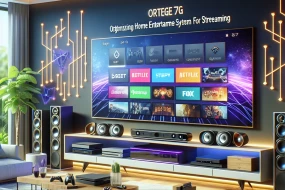
In today's digital age, integrating technology into our homes isn't just a luxury—it's becoming a necessity. For home improvement enthusiasts, DIY tech projects offer a perfect blend of creativity, practicality, and innovation. Whether you're a seasoned DIYer or just getting started, these projects can transform your living space into a smarter, more efficient haven. This article delves into some of the most exciting and impactful DIY tech projects you can undertake. So, roll up those sleeves and get ready to bring your home into the future.
Smart Lighting Systems: Illuminate Your Home the Intelligent Way
Smart lighting is one of the simplest yet most effective ways to enhance your home's ambiance and energy efficiency. By installing smart bulbs and switches, you can control your lighting remotely, set schedules, and even change colors to suit your mood. One common mistake is not considering the compatibility of smart bulbs with existing fixtures. Always check the voltage and fitting types. Additionally, using apps like Philips Hue or LIFX can simplify the setup process and offer a plethora of customization options.
Home Automation with DIY Smart Plugs
Smart plugs are the unsung heroes of home automation. They allow you to control any device plugged into them via your smartphone or voice assistant. Imagine brewing your morning coffee without leaving your bed! A practical tip is to start with a few high-use appliances, like lamps or fans, to see the impact. However, avoid overloading a single outlet with multiple smart plugs to prevent circuit issues. Brands like TP-Link and Wemo offer reliable options that are easy to install and use.
DIY Security Cameras: Peace of Mind with a Personal Touch
Security is paramount, and setting up your own DIY security camera system can provide peace of mind without breaking the bank. Kits like Arlo or Blink offer wireless solutions that are easy to install and monitor. A pro tip is to place cameras at key entry points and ensure they are connected to a secure network. Many DIYers forget to regularly update firmware, which can leave systems vulnerable. Regular maintenance and software updates are crucial for optimal performance and security.
Build Your Own Media Server: Endless Entertainment at Your Fingertips
For the entertainment buffs, creating a personal media server is a dream come true. By using software like Plex or Kodi, you can store and stream all your media content across devices effortlessly. Start with a dedicated server device, like a Raspberry Pi or an old computer. A common pitfall is not considering storage needs; ensure you have enough capacity for your media library. This project not only organizes your media but also enhances streaming quality and speed.
DIY Smart Thermostat: Comfort Meets Efficiency
Smart thermostats are a game-changer for energy efficiency and comfort. By learning your habits and adjusting temperatures accordingly, they can significantly reduce energy bills. The Nest Learning Thermostat or Ecobee are popular choices that offer intuitive interfaces and easy installation. Remember to check compatibility with your HVAC system before purchasing. A mistake to avoid is neglecting regular software updates, which can improve functionality and security over time.
Voice-Controlled Home Assistants: Your Personal Butler
Integrating a voice-controlled assistant like Amazon Echo or Google Home can centralize control of your smart devices. These assistants can manage everything from your music playlist to your grocery list. To maximize efficiency, ensure your devices are compatible and connected to the same network. One common oversight is not customizing privacy settings, which is crucial for protecting personal data. Tailor these settings to suit your comfort level.
DIY Air Quality Monitoring: Breathe Easy at Home
With increasing concerns about air quality, setting up a DIY air quality monitor can help you keep track of pollutants and allergens in your home. Kits like the AirVisual Node or the Awair Element offer comprehensive data on air quality metrics. Position your monitors in high-traffic areas for accurate readings. Avoid placing them near windows or vents, as this can skew results. Regular calibration and maintenance are key to ensuring accurate data.
Automated Garden Systems: Cultivate with Ease
For those with a green thumb, automated garden systems can make plant care more manageable and efficient. By using sensors and timers, you can automate watering and monitor soil conditions. Platforms like Arduino or Raspberry Pi can be used to create custom solutions tailored to your garden's needs. A common mistake is over-reliance on automation; manual checks are still necessary to ensure everything is functioning correctly. This project not only saves time but also promotes healthier plant growth.































